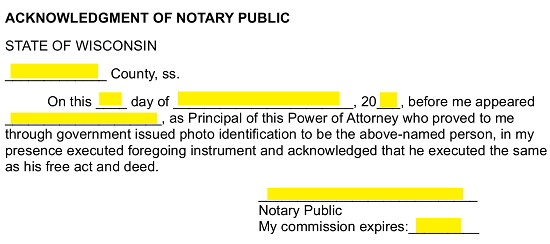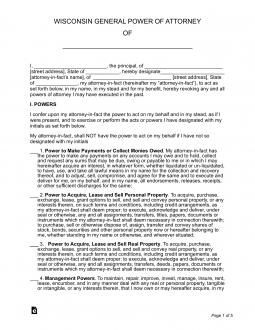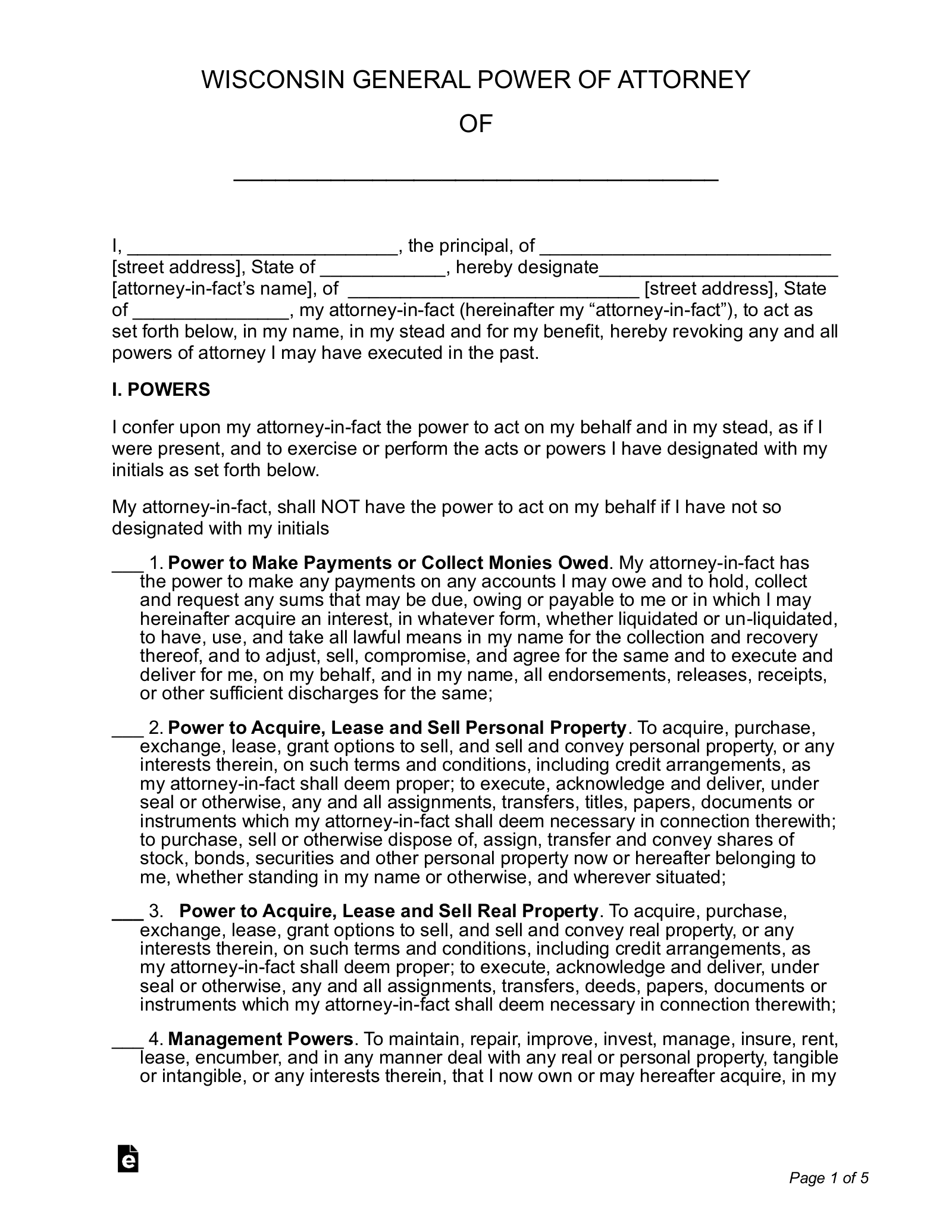Updated August 09, 2023
A Wisconsin General (Financial) Power of Attorney Form gives you the ability to name a specific party to handle your financial affairs at your direction. Typically, this is useful when some or all your business requires your personal authority to be exerted but you will be unable or somewhat unavailable (i.e. you are on a long-term vacation or on a military deployment). Regardless of the reason, you will need to make sure your choice of agent is made wisely as this entity will be acting as if he or she had the authority to decide on your affairs. In fact, that is precisely what he or she can do. The extent of what the agent can decide on or what actions he or she can engage in while acting in your name is up to you and will be documented in this paperwork. It is worth noting this appointment of principal power will automatically terminate if you are struck with a traumatic medical event that leaves you incapacitated and have been declared (by a physician) that you are unable to communicate. In some cases, this may not be ideal. If the agent should retain his or her right to represent you, then you may wish to review the Wisconsin Durable POA instead.
Laws
- Statutes – Uniform Power of Attorney for Finances and Property Act
- Authority (W.S.A. 244.41) – An agent under a power of attorney may act on behalf of the principal and exercise broad authority as granted by the agreement.
- Signing Requirements (W.S.A. 244.05) – Notary Public.
How to Write
Download: PDF, MS Word, OpenDocument
1 – Use The Introduction Areas For Party Identification
The Principal’s First, Middle, and Last Name should be supplied to the Title of this document. A blank line at the end of the wording will accept this information.  The paragraph under the Title presents six blank areas. Each one has been placed within the structure, so the completed terminology will form a declaration statement. This statement will name the Principal as the individual giving the Agent the right to take Actions and make Decisions on his or her behalf.
The paragraph under the Title presents six blank areas. Each one has been placed within the structure, so the completed terminology will form a declaration statement. This statement will name the Principal as the individual giving the Agent the right to take Actions and make Decisions on his or her behalf.  The three available spaces at the beginning of this paragraph call for the Name of the Principal along with his or her Residential Street Address and State to be recorded across them (in this order).
The three available spaces at the beginning of this paragraph call for the Name of the Principal along with his or her Residential Street Address and State to be recorded across them (in this order).  The last three spaces of this paragraph seek a definition to the Agent. Supply this request by entering the Agent’s Name, Address, and State on them
The last three spaces of this paragraph seek a definition to the Agent. Supply this request by entering the Agent’s Name, Address, and State on them 
2 – The Principal Powers That Can Be Delivered Are Set In A List For Principal Approval
The Principal will have to participate in this paperwork’s preparation so that its execution may be considered valid. The next section will require such attention. Here, in Article I, the Principal must read through the subject items discussed here then initial each one he or she wishes to designate to the Agent’s Principal Authority. These initials will give the Agent the right to perform all actions in the approved subject item.
The first subject item will enable the Principal to give the Agent the right to make and collect payments on his or her behalf. A variety of actions the Principal will approve the Agent to complete will be listed in this paragraph. The Principal should initial the blank line attached to “1. Power To Make Payments Or Collect Monies Owed.”  If the Principal has determined the Attorney-in-Fact should be able to utilize Principal Authority to “Acquire, Lease And Sell Personal Property” in the name of the Principal, then the Principal must initial the second subject item to approve the Attorney-in-Fact’s ability to conduct all the activities defined in its contacts.
If the Principal has determined the Attorney-in-Fact should be able to utilize Principal Authority to “Acquire, Lease And Sell Personal Property” in the name of the Principal, then the Principal must initial the second subject item to approve the Attorney-in-Fact’s ability to conduct all the activities defined in its contacts.  The Principal can give the Attorney-in-Fact the approval to take all the Principal actions defined in the third subject item to “Acquire, Lease, And Sell Real Property” using the Principal’s Name by initialing the blank line attached to the number 3
The Principal can give the Attorney-in-Fact the approval to take all the Principal actions defined in the third subject item to “Acquire, Lease, And Sell Real Property” using the Principal’s Name by initialing the blank line attached to the number 3  The Attorney-in-Fact, named above, can be designated with the “Management Powers” that are detailed in the fourth paragraph. The Principal will have to initial the blank space attached to the number 4 to include this type of subject matter in the Principal Powers delegated to the Attorney-in-Fact.
The Attorney-in-Fact, named above, can be designated with the “Management Powers” that are detailed in the fourth paragraph. The Principal will have to initial the blank space attached to the number 4 to include this type of subject matter in the Principal Powers delegated to the Attorney-in-Fact.  If the Attorney-in-Fact should be given Principal “Banking Powers” then the Principal’s initials will be required to the fifth paragraph
If the Attorney-in-Fact should be given Principal “Banking Powers” then the Principal’s initials will be required to the fifth paragraph  The Attorney-in-Fact will have the Principal right to handle matters regarding “Motor Vehicles” through the Principal act of initialing “6. Motor Vehicles.”
The Attorney-in-Fact will have the Principal right to handle matters regarding “Motor Vehicles” through the Principal act of initialing “6. Motor Vehicles.”  The Principal can use the subject item labeled “7. Tax Powers” to approve the Attorney-in-Fact’s use of representational Principal Powers with interested Tax Entities.
The Principal can use the subject item labeled “7. Tax Powers” to approve the Attorney-in-Fact’s use of representational Principal Powers with interested Tax Entities. 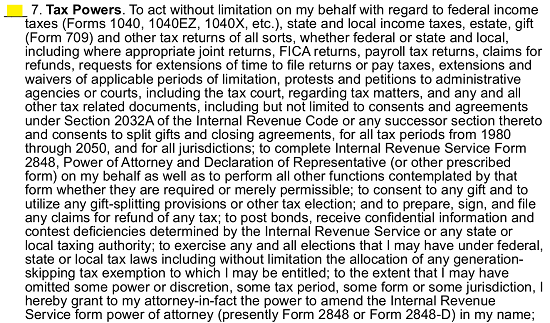
If the Principal’s Authority when dealing with “Safe-Deposit Boxes” should be granted to the Attorney-in-Fact, then make sure the Principal’s initials have been supplied to the eighth subject item on this list  Once the Principal initials the ninth subject item, “9. Gift Making Powers,” then the Attorney-in-Fact will be able to utilize Principal Authority to perform actions such as making gifts or forgiving loans in the Principal’s name
Once the Principal initials the ninth subject item, “9. Gift Making Powers,” then the Attorney-in-Fact will be able to utilize Principal Authority to perform actions such as making gifts or forgiving loans in the Principal’s name  The Attorney-in-Fact will be designated with the Principal Authority regarding “Lending And Borrowing” practices when the Principal initials the tenth subject item
The Attorney-in-Fact will be designated with the Principal Authority regarding “Lending And Borrowing” practices when the Principal initials the tenth subject item  The Power to use Principal Authority to enter “Contracts” using the Principal’s Name can be delivered to the Attorney-in-Fact, if the Principal initials the eleventh statement
The Power to use Principal Authority to enter “Contracts” using the Principal’s Name can be delivered to the Attorney-in-Fact, if the Principal initials the eleventh statement ![]() The Principal Authority required to make Health Care decisions and take Principal Actions in Health Care can be appointed to the Attorney-in-Fact when the Principal initials “12. Health Care.”
The Principal Authority required to make Health Care decisions and take Principal Actions in Health Care can be appointed to the Attorney-in-Fact when the Principal initials “12. Health Care.”  If the Attorney-in-Fact should have representational Powers as per the Health Insurance Portability And Accountability Act Of 1996″ then the Principal should initial “13. HIPAA”
If the Attorney-in-Fact should have representational Powers as per the Health Insurance Portability And Accountability Act Of 1996″ then the Principal should initial “13. HIPAA” ![]() The Principal’s delegation of Authority can include the “Power TO Hire And Pay For Services” in the definition of the Attorney-in-Fact’s Principal Powers if the Principal initials the fourteenth subject item on this list
The Principal’s delegation of Authority can include the “Power TO Hire And Pay For Services” in the definition of the Attorney-in-Fact’s Principal Powers if the Principal initials the fourteenth subject item on this list  In the event the Principal has decided the Attorney-in-Fact can utilize Principal Power to deliver “Reimbursement Of Attorney-in-Fact” then the Principal must initial the fifteenth subject item
In the event the Principal has decided the Attorney-in-Fact can utilize Principal Power to deliver “Reimbursement Of Attorney-in-Fact” then the Principal must initial the fifteenth subject item ![]()
The Principal can authorize the Attorney-in-Fact’s use of Principal Power to “Sue Third Parties Who Fail To Act Pursuant To Power Of Attorney” through the wording in the sixteenth subject item  The Attorney-in-Fact’s Principal Powers can include any additional Powers the Principal chooses to have documented in the seventeenth item. This subject item must be initialed once the detail of additional Powers the Principal wishes to grant the Attorney-in-Fact has been listed
The Attorney-in-Fact’s Principal Powers can include any additional Powers the Principal chooses to have documented in the seventeenth item. This subject item must be initialed once the detail of additional Powers the Principal wishes to grant the Attorney-in-Fact has been listed 
3 – A Pre-Determined Start Date And Termination Date Must Be Documented
The Third Article, “Effective Date And Termination,” will require our focus to turn to when the Attorney-in-Fact can use Principal Powers. Naturally, this will involve defining the first Calendar Date when the Attorney-in-Fact can wield the Authority defined above. The Principal can do this by simply initialing one of the first two statements in this section. If the first is initialed, then the Start Date will be this document’s Principal Signature Date. 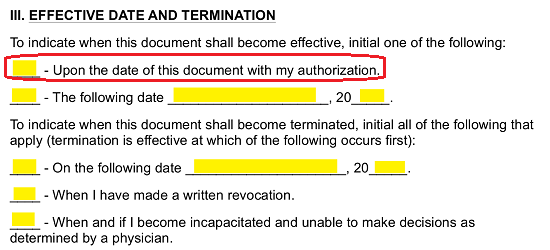 If the Principal has decided these Powers should take effect at a later Date, then he or she should record this Date in the second statement after the words “The Following Date…” then initial the second statement.
If the Principal has decided these Powers should take effect at a later Date, then he or she should record this Date in the second statement after the words “The Following Date…” then initial the second statement. 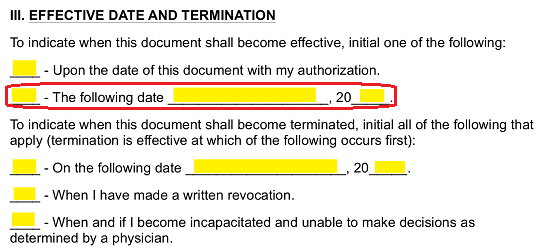 Now the Principal must define how these Principal Powers will terminate or expire. This Termination Date may be defined as one of three Calendar Dates. If it is a specific Date, then the Principal must initial the statement “On The Following Date…” and provide the Termination Date after these words.
Now the Principal must define how these Principal Powers will terminate or expire. This Termination Date may be defined as one of three Calendar Dates. If it is a specific Date, then the Principal must initial the statement “On The Following Date…” and provide the Termination Date after these words. 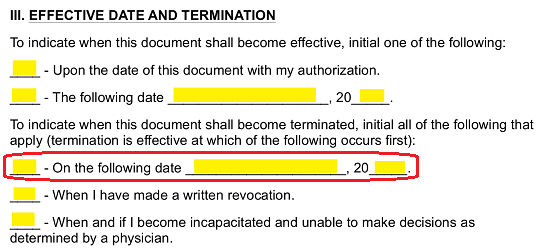 The Principal may decide these Powers should stay in effect until whatever Calendar Date on a written Revocation he or she issues is by initialing the statement with “When I Have Made A Written Revocation”
The Principal may decide these Powers should stay in effect until whatever Calendar Date on a written Revocation he or she issues is by initialing the statement with “When I Have Made A Written Revocation” 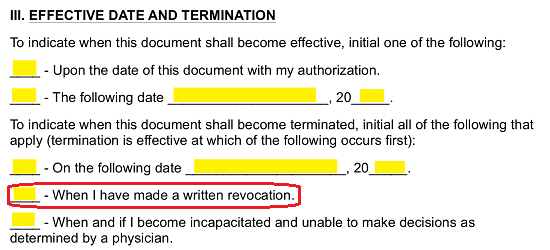 If the Principal has determined these Powers remain Effective until the Calendar Date he or she is “Determined By A Physician” to have been rendered disabled and unable to make his or her decision, then he or she must initial the statement beginning with “When And If I Become Incapacitated…”
If the Principal has determined these Powers remain Effective until the Calendar Date he or she is “Determined By A Physician” to have been rendered disabled and unable to make his or her decision, then he or she must initial the statement beginning with “When And If I Become Incapacitated…” 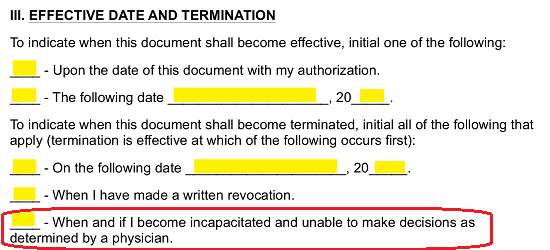
4 – The Conclusion Of This Document Presents The Area For Execution
The last article requiring attention, “Third Party Reliance,” shall conclude the delegation of Power and supply a method of execution with the last statement. The Principal must record the Date he or she signs this paperwork using the blank spaces in the last section.  Once the Principal has dated the Day of this signing then he or she must sign the line below this statement as well as Print his or her Name.
Once the Principal has dated the Day of this signing then he or she must sign the line below this statement as well as Print his or her Name.  Next, supply the Full Printed Name of the Attorney-in-Fact under the heading “Acceptance Of Appointment.” The Principal chosen Attorney-in-Fact must provide his or her Signature and Printed Name on the blank lines labeled “Attorney-in-Fact’s Signature” and “Attorney-in-Fact’s Printed Name.”
Next, supply the Full Printed Name of the Attorney-in-Fact under the heading “Acceptance Of Appointment.” The Principal chosen Attorney-in-Fact must provide his or her Signature and Printed Name on the blank lines labeled “Attorney-in-Fact’s Signature” and “Attorney-in-Fact’s Printed Name.” 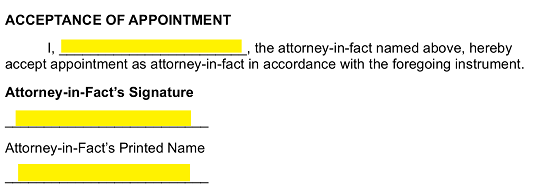 The Notary Public present at the time of signing will use the “Acknowledgment Of Notary Public” section to notarize this execution
The Notary Public present at the time of signing will use the “Acknowledgment Of Notary Public” section to notarize this execution 